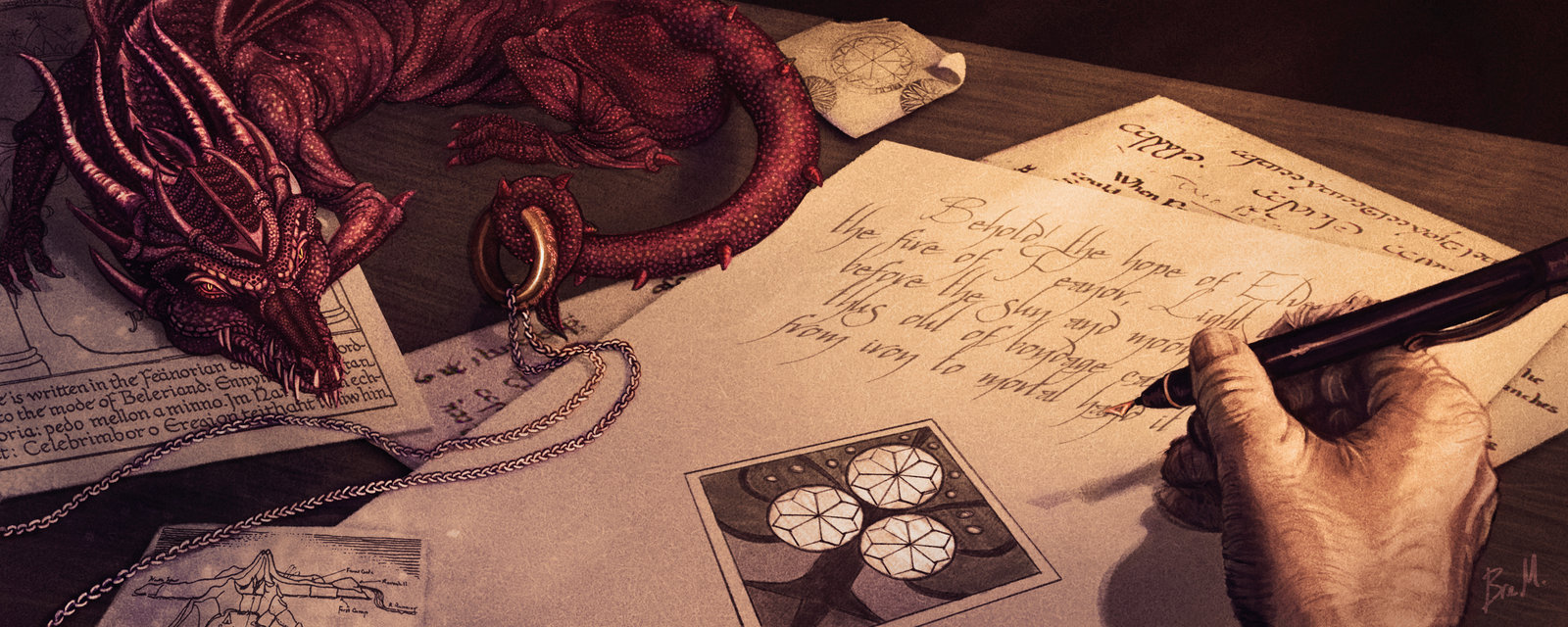
Tolkien’s Desk by 89ravenclaw on DeviantArt.
I’m going to admit it up front: I love J.R.R. Tolkien’s work. I’m particularly fond of Middle Earth but my favorite book is not The Lord of The Rings. It’s The Silmarillion. I know, I know, that dry historical tome that reads like a bible? YES. That one. I love it. It is epic and dark and lyrical and poetic. It’s also kind of banana pants.
Which is why I’m thrilled to be doing recaps of some of the stories from The Silmarillion that, along with being hopefully informative about some of the extended world stuff Tolkien created, will also maybe make you give this huge world building volume a chance if you haven’t been inclined to before. Fair warning: Settle in because, even though I will be condensing things, there’s pretty much no way to make this “short”.
Some Notes:
- I will be sticking to The Silmarillion as published, not the Unfinished Tales and additional versions of some of the stories Christopher Tolkien has put out in other volumes. While I like reading those for the various different edits, let’s at least try to simplify this complex world a little.
- Since I’m jumping around a bit, here are names and terms you can reference so it’s not too confusing:
Eru Illúvatar: The creator. He is a relatively benevolent uber god who creates the Valar and, through them, the world. He is not directly involved in the concerns of Middle Earth though he does have a kind of “plan” for it. It’s also ineffable so don’t even try to guess.
The Valar: A group of high beings, sort of like 2nd tier gods, responsible for the actual nuts and bolts making of the earth. They are divided into male and female and each has dominion over certain elements and/or concepts. They are:
Manwë, Aulë, Ulmo, Tulkas, Oromë, Mandos and Lórien for the “male”.
Varda, Yavanna, Nienna, Estë, Vairë, Vánna and Nessa for the “female”.
Although the Valar care deeply for what happens in Middle Earth they avoid direct action over elves and men, allowing them to make their own choices. They are revered but not really worshipped, and it’s mainly the elves who call to or bless them.
Morgoth/Melkor– He used to be a Vala, was in fact first in the favor of Illuvatar. However his obsession with power and destruction ultimately turns him to dark and horrible actions.
Aman/The Undying Lands: This is where most of the Valar reside and the chief city is Valinor. It is removed from the main lands of Middle Earth though originally it was connected. Certain tribes of the first-born elves live there after their “awakening”, including the Noldor who this recap particularly concerns. It’s a paradise for the most part but things gradually go pear-shaped. Which is where we begin…
The Silmarillion starts with the creation of Arda, The World That Is. Which is probably one of my favorite ideas in all of lit. Tolkien has his world begin with music, with a melding of voices and ideas and cosmic discord that result in something new in a vast Void.
But that’s not what I’m going to talk about today. While that concept is beautiful and poignant and biblical, I’m here to talk about elves. Lots and lots of elves. Especially the jerk elves.
If you got the impression that, at worst, elves were just kind of aloof and mopey from LOTR, well, I’m here to tell you: they can be EPIC assholes, too. And one of the biggest jerk elves, one might even call him The High Elf King of Douchebagdom, is Fëanor.
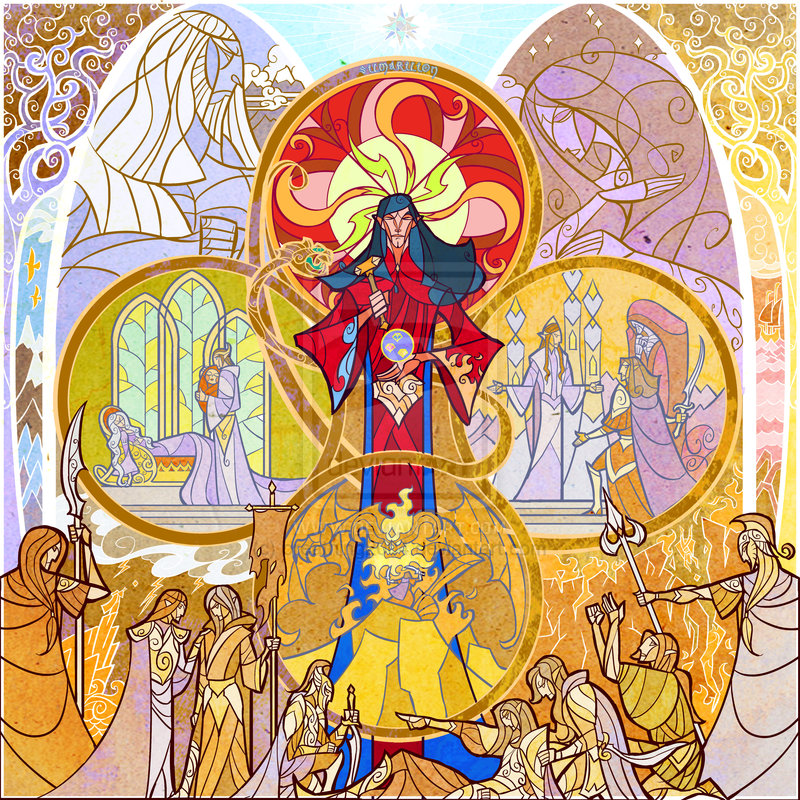
Feanor and Silmarils by breathing2004 on DeviantArt.
In many ways, Fëanor embodies all of Tolkien’s favorite themes, especially the intersection of pride, greed and obsessive possessiveness. His birth was apparently so exhausting that his mother was like, ugh, I am DONE and willingly let her spirit depart to the Halls of Mandos (elves don’t “die” the way men do, their spirits are tied to the world so they go to a place within it rather than get freed from it in death. It’s why they love the world as much as they do, their fates are wrapped up in it completely, but it’s also something of a burden for obvious reasons).
Fëanor’s dad Finwë, who is high king of the Noldor, remarries. Fëanor ends up with two half brothers and two half sisters who are a lot more reasonable than he is. Fëanor decides he doesn’t like his stepmom for reasons and goes off to do his own thing, and ends up having seven sons of his own (for which I can only feel a great deal of sympathy for his wife. Fëanor must have been a really obnoxious husband even beyond all that kid having).
While Fëanor doesn’t start off bad, he does exhibit some less than thrilling personality traits early on, especially those in the I Am A Very Special Snowflake category we all know and loathe.
Now, some of Fëanor’s pride is justified. He was an extremely talented maker of things, like the elves’ first written language, a whole lot of pretty jewelry, the seven Palantíri (the seeing stones we only get to see one of in LOTR) and lots of other beautiful crafts. But his crowning achievements are the three Silmarils, a triad of jewels that capture the combined luminescence of the two Trees in Aman that light the world. They are supposed to be the most incredible works ever created, suffused with light and beauty, a wonder to all that look upon them. So you just know that’s not going to end well.
Previous to this two huge lamps had lit the world but Morgoth, because he’s The Worst, destroyed them earlier on, like a frat boy who thinks knocking shit over is hilarious. This probably should have been a clue that keeping things that light up the world where Morgoth can get at them is not a great idea. But we’ll get to that later. In any case, Morgoth had been imprisoned ever since the Great Lamp debacle and things have been pretty sweet and peaceful because of it.
After making the Silmarils, Fëanor becomes obsessed with his own jewels, guarding them jealously, and becomes increasingly convinced that everyone wants to take them from him. Basically he skipped that part of kindergarten where they talk about sharing. For a while this isn’t an issue. Aman is peaceful, the Valar are not even remotely interested in his jewels, and everyone kind of just shrugs and says, “That’s our Fëanor!”
This is unfortunate because Fëanor basically creates an echo chamber of suspicion and paranoia and convinces himself that everyone is out to get him. Even though no one actually is. Yet. It’s almost the definition of a self-fulfilling prophecy.
So, because the Valar are actually very nice and good and merciful (and also a wee bit dense) they eventually let Morgoth out of his confinement. Morgoth also likes to make things but he’s not nearly as good at it as Fëanor and so pretty much hates the elf on basic principle. This is a running theme for Morgoth, he hates everything and everyone and does his best to ruin whatever he can get his hands on. This especially includes anything the other Valar make or value, like the lamps, trees, and their relationship with the elves who reside with them.
While everyone else is busy having dance parties and celebrating how beautiful and peaceful Aman is, Morgoth sets to work sowing dissent. Although Fëanor doesn’t trust him because he’s not an idiot, he still listens to a lot more of Morgoth’s bullshit than anyone should. But Morgoth is a smart, cagey, fellow and knows exactly how to work on Fëanor’s ego. He knows a fellow narcissist when he sees one. He pits Fëanor against his half brother Fingolfin, who is actually kind of the best. Fëanor starts making weapons in secret and eventually publicly threatens Fingolfin for trying to “usurp” him. Which is news to Fingolfin and everyone else. The Valar banish Fëanor to a removed stronghold where his paranoia really sets in. He locks up the Silmarils in a special box and proceeds to spend way too much time by himself admiring them.
And that’s when things go bonkers.
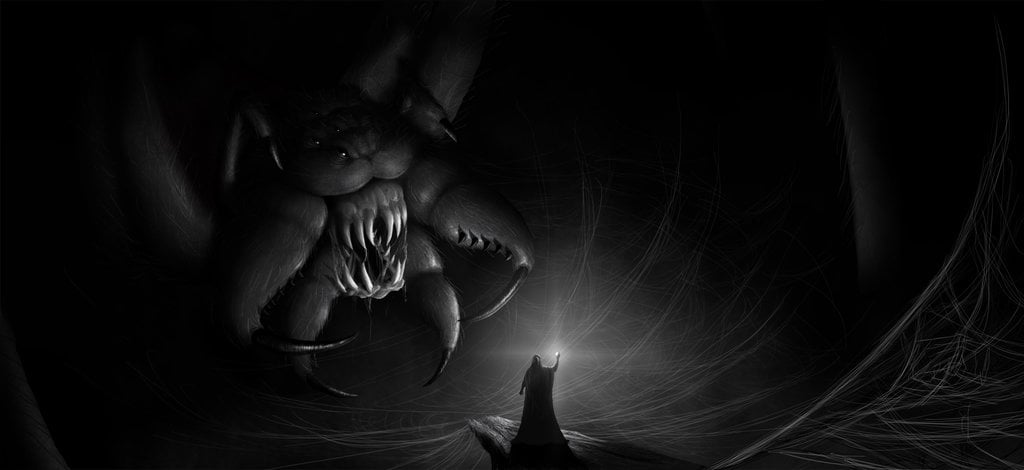
Ungoliant Demands The Silmarils by KarlLevy on DeviantArt
The other Valar realize something is really not right here with these weird ass rumors flying around and think, hey, maybe it’s that dude we let out who has never been trustworthy and is still pretty pissed at us for locking him up. They try to find Morgoth, but have no luck. Mr. Evil tries to get Fëanor to give him the Silmarils for safe-keeping but not even Fëanor is that dense. Morgoth has a snit and runs off.
The Valar try and convince Fëanor and Fingolfin to make amends because they often miss the forest for the trees. While they’re doing that, Morgoth finds Ungoliant, an enormous spider creature that makes Shelob look cute. Ungoliant resides somewhere in the south of Aman, which leads me to think that the Valar should probably invest in pest control at some point. In any case Morgoth befriends her and takes her to Valinor where she proceeds to suck the life out of the trees and throws the world into darkness. This is, as you would imagine, bad.
The Valar try and convince Fëanor to let them use the Silmarils to light the world back up and he refuses because he’s a selfish ass. Its then that a messenger arrives to tell everyone that Morgoth has stolen the Silmarils and killed Fëanor’s father. This is the first murder to occur in Aman. And everyone goes batshit.
Fëanor is now High King and, more because his jewels were stolen than that his father was killed, he goes into a rage. He blames the Valar for Morgoth’s deeds, which is convenient since one could just as easily argue that if he hadn’t been such a paranoid, covetous douchecanoe, it would have been a lot harder for Morgoth to manipulate him and get his hands on them jewels. In any case, Fëanor rallies a great deal of the Noldorian elves to go to Middle Earth to get back three rocks he refuses to share with anyone. So it had to have been some speech.
Fëanor also makes one of the worst oaths in the history of oaths, which his sons also take. They all come to seriously regret it. Actually, pretty much everyone in Middle Earth and Aman regrets that oath because it brings nothing but pain and ruin onto anyone it touches, even those who had nothing to do with it.
Essentially the oath says that those who take it must find the Silmarils at all costs and kill anyone who possess them or hinders them, be they friend or foe. If they do not hold up their end of the oath they will be cast into the eternal Darkness. So it’s not messing around. It’s also an incredibly foolish oath to make over some rocks that, regardless of how pretty, are not as valuable as another life. Fëanor has some messed up priorities and his sons aren’t much more sensible at the time.
Not long after this oath, three groups of the Noldor attempt to leave Aman by the coast. They are resisted by the Teleri elves who live there and make ships and want no part of the drama llama that is Fëanor. So Fëanor’s followers slaughter them, the very first kin-slaying. This is when the Valar banish them, because seriously, that’s effed up.
They then take the ships and leave the other, not-murdering Noldor behind. And when they get to Middle Earth they burn the ships so that those who still wished to leave have to take the long way, over treacherous, icy terrain where a whole lot of them die and think Fëanor might, in fact, be terrible. He has become a completely megalomaniacal tyrant at this point and anyone even remotely sane is having second thoughts about this whole thing.
Sidenote: one of the elves who leaves Aman is Galadriel, although she doesn’t like or trust Fëanor. She wants a realm of her own and so decides to take up the journey. She does not, however, participate in the kin-slaying nor did she swear any oath. This should give you some idea of just how old she is by the time LOTR comes around. It’s also why she is so glowy and powerful, because she was born in and retains the Light of Aman even in exile.
Now, because Fëanor is a crazy sociopath at this point, he goes straight after Morgoth, forgetting that he is a Very Big Bad with an army that’s just been hanging out, getting bigger, and waiting for him to get back. That includes a whole hell of a lot of Balrogs, orcs, and assorted creatures. Fëanor, in his ever-increasing delusion, tries to get to Morgoth in his own stronghold and is eventually mortally hacked and hewed by a mess of Balrogs, including Gothmog. The elves win the day but Fëanor is toast. As he’s being carted off the bloody battle scape he helped create, he sees with bitter foresight that none of his kindred will ever possess the Silmarils or throw down Morgoth. Then he turns to ash. And good riddance, really. Dude caused way more trouble than he was worth.
Now, if it all just ended there with his death, so much the better. Unfortunately the taint of the oath colors the next several thousand years, causing countless wars, horrifying deaths, two more kin-slayings, and just the most epic amounts of grief you can imagine. In fact, the events of The Silmarillion still have ramifications by the time LOTR comes around (one of Fëanor’s descendant’s made the three elven rings and taught Sauron some of his craft. Oops!)
It also quite literally reshapes the world at a certain point when the Valar eventually have to step in and stop Morgoth from destroying everything they’ve worked so hard to build. The seas, mountains, and lands all get shifted in a great cataclysmic battle and the two remaining Silmarils end up lost forever (the other became a star, but that’s another story). So clearly it was all definitely worth it.
All this over three pretty jewels one really arrogant elf made and refused to share because he loved them more than anything and didn’t think pesky things like consequences applied to him. Like I said earlier, High Elf King Douchebag.
There’s a lot in the story of Fëanor that looks at the sometimes unhealthy relationship a creator can have with what they create, why coveting is pretty much the worst, and how easy it is to twist noble intentions when it comes to valuing things over lives. Because while Fëanor was clearly an asshole, he wasn’t inherently evil. He made choices and those choices eventually led to terrible things because they were based in selfish motivations that never took anyone else into consideration at all.
Next time we’ll explore more of the fallout from Fëanor’s little obsession, but this time it will include doomed love, vampire-bat-shifting elf women (yes really!), werewolves, and even more people dying. Yay, Tolkien!
Mariah is a comic book writer, editor, and artist. You can find her on Twitter having long rants about Tolkien, pop culture, and tea. She likes cupcakes and cephalopods a lot.
Are you following The Mary Sue on Twitter, Facebook, Tumblr, Pinterest, & Google +?



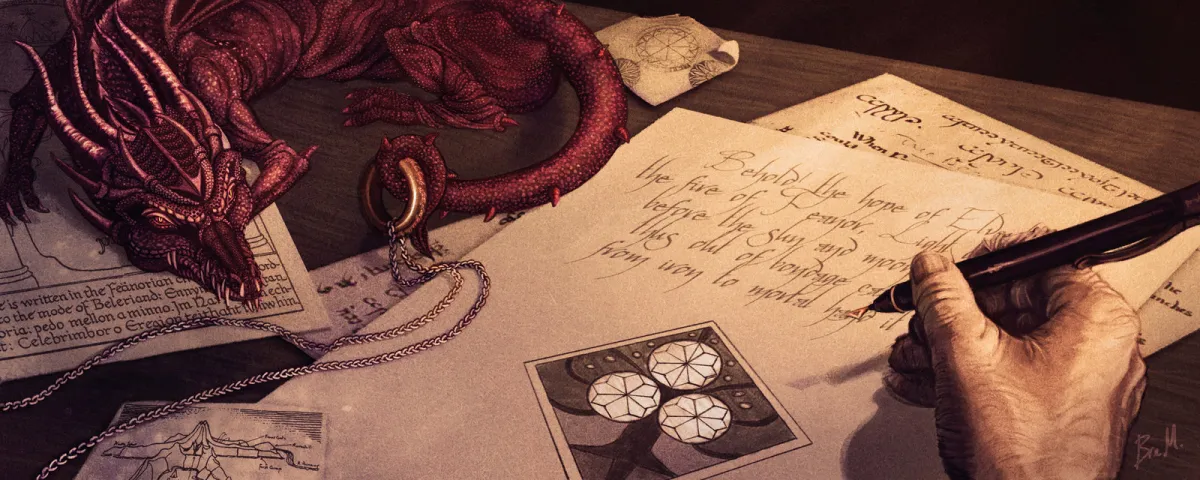
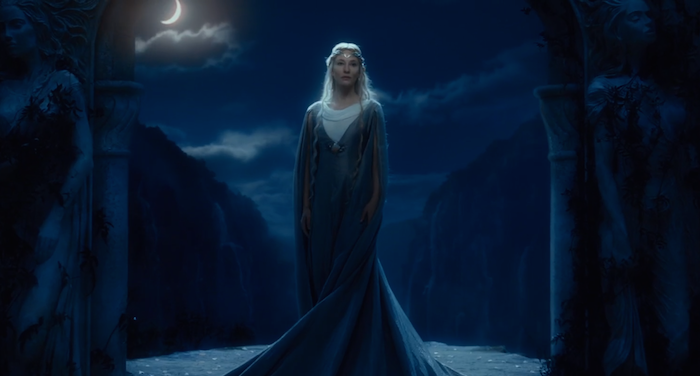





Published: Jan 16, 2015 04:59 pm